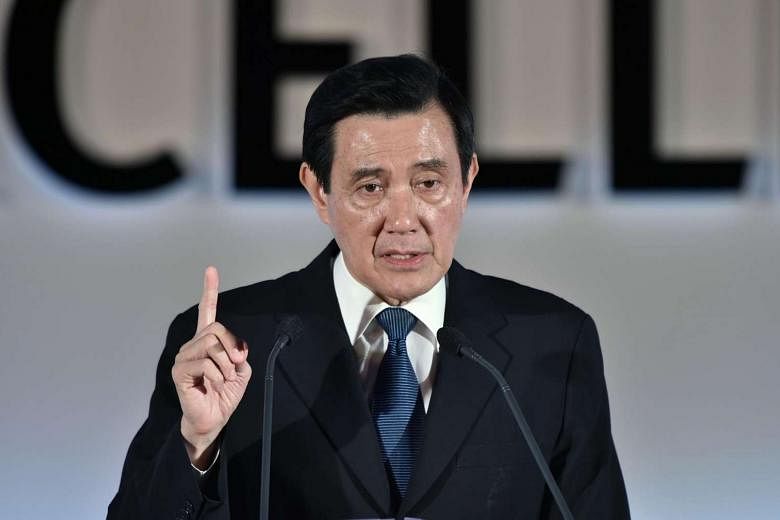In its editorial on June 14, the paper says the new Taiwan administration's decision preventing former president Ma Ying-jeou from visiting Hong Kong was not well thought through.
Taiwan's Presidential Office announced on Sunday (June 12) that it rejected the application by former president Ma Ying-jeou to travel to Hong Kong to deliver a keynote speech on June 15 at the invitation of the Society of Publishers in Asia (SOPA).
Presidential spokesman Alex Huang pointed out that as a former president who has only recently stepped down from office, Mr Ma has knowledge of the nation's top secrets that is still relevant.
That makes a potential visit to Hong Kong, the "extremely sensitive" Chinese city, a national security risk, Mr Huang said.
Mr Huang further explained that due to such risks and the lack of precedent, as well as the lack of time to properly coordinate with the authorities in mainland China and Hong Kong, the presidential office decided against Mr Ma's visit.
The review was based on Article 26 of the Classified National Security Information Protection Act, which stipulates that persons "who may exercise authority regarding classification" or "handle classified information within the scope of official duty" must obtain approval from their serving agency prior to departing the nation at any time within three years of retirement or resignation from their post.
Mr Ma is the first former president to apply for such approval.
The Information Protection Act was passed into law in 2003, three years after former president Lee Teng-hui stepped down.
Former president Chen Shui-bian has not left the country since the end of his tenure in 2008 and his conviction and 19-year sentence for corruption in 2009.
Mr Ma's office criticised the decision, calling it "disrespectful to a former head of state" and saying that it will "likely hurt Taiwan's international reputation for freedom and democracy".
His office further said that the decision is "disrespectful of a former head of state", considering that the speaking event will be public and the former president will "exhibit a high-degree of self- restraint".
The Presidential Office has the legal authority to make the decision.
And while putting a former head of state under travel restriction is demeaning, the problem lies with Article 26 of the Information Protection Act, which is primarily intended to prevent former intelligence or military officials from leaking sensitive information to nations where the information may create a security risk, such as mainland China.
Putting all retired or resigning officials under travel check is indeed overkill and a sign of disrespect.
What's worse, such a ban will not do much to deter individuals with real intent to sell their knowledge to foreign authorities.
However, the review of Mr Ma's application in itself is not necessarily "damaging" to Taiwan's reputation. It simply shows that the president is not above the law.
That said, the Presidential Office's decision shows its lack of creativity and its conservative mindset.
There is no substantial reason to believe that Mr Ma's visit to Hong Kong, which the former president's office said would involve a public appearance and be handled with high self-restraint on Mr Ma's part, would be a major security risk.
By banning Mr Ma's visit on the grounds of a lack of precedent and time for review, the Presidential Office was playing things safe by avoiding uncharted waters even though it no doubt understands that such a decision would put it on the defensive.
Already, Kuomintang lawmakers are making the comparison between what they described as the new government's relaxed approach towards former president Chen's "non-attendance" at a fundraising banquet in Taipei and its heavy-handed treatment of Ma.
More importantly, the Presidential Office is missing an opportunity by playing it safe.
Politically, the new government might want to deny Mr Ma the position of the top cross-strait key man the former president apparently aims for since his meeting with Chinese leader Xi Jinping last year.
The SOPA keynote speech, however, presents a good platform for the government to promote Taiwan's point of view while putting China and Mr Ma to the test.
The SOPA invited Mr Ma in his capacity as "the former president of Taiwan", merely the mention of such a title in a Chinese city would be unprecedented.
With the keynote speech taking place less than two weeks after the anniversary of the Tiananmen Crackdown, it is likely that Mr Ma would be prompted to address the issue, which is a taboo in mainland China.
If Mr Ma ignores the topic, he will lose credibility as a promoter of freedom and if Mr Ma dwells on it, it will greatly challenge Beijing.
Either way, the new administration would have stood to gain.
By keep Mr Ma from making the trip, the Presidential Office puts itself on the wrong side of the argument while saving China a lot of headache.

